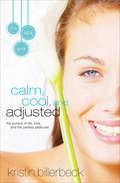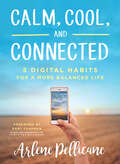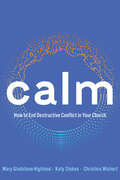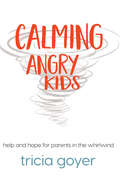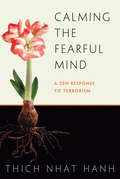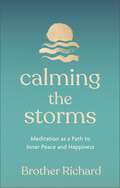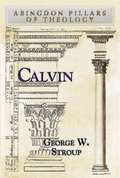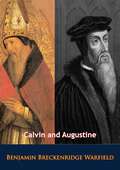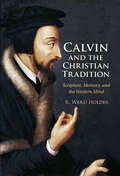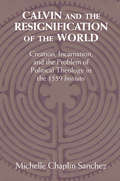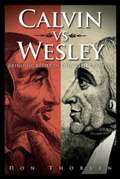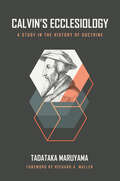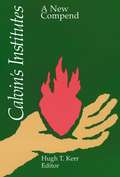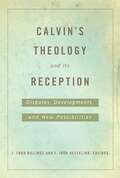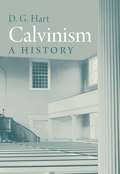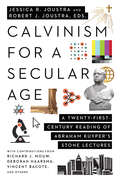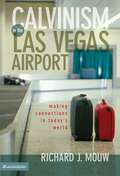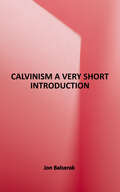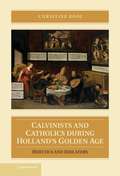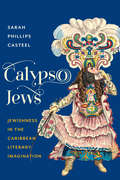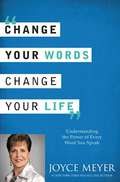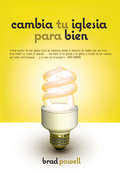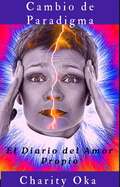- Table View
- List View
Calm, Cool, and Adjusted
by Kristin BillerbeckSilicon Valley chiropractor Poppy Clayton is as calm, cool, and adjusted as they come . . . or is she?Known for her bad fashion sense, a love for all things natural, and the inability to get a second date, Poppy is beginning to wonder if she might be misaligned herself.Poppy's route to self discovery will be an unnatural one involving a plastic surgeon (of all people!), a condemned house in Santa Cruz, and a wedding date from the dark side. It's enough to send a girl and her gal pals running for their favorite spa!
Calm, Cool, and Connected: 5 Digital Habits for a More Balanced Life
by Arlene PellicaneFor those feeling overloaded with technology… Let&’s face it: most of us are on our phones or computers way more than we&’d like to be, and more than what&’s even beneficial. We know that overuse of technology is harmful to our health and relationships, but how can we rewire our digital habits for a healthier life? In Calm, Cool, and Connected, Arlene Pellicane will walk you through an easy 5-step plan that will help you center your life on Jesus and love others by decluttering your screen time. By introducing a few easy habits into your daily routine, you can transform your relationship with technology and enjoy more time with God and others. It's easy to become consumed and preoccupied with our devices. In turn, we begin to suppress or ignore what&’s most important, focusing instead on the urgent and sensational. Let this book guide you toward balanced technology use, and thus a more balanced life.
Calm, Cool, and Connected: 5 Digital Habits for a More Balanced Life
by Arlene PellicaneFor those feeling overloaded with technology… Let&’s face it: most of us are on our phones or computers way more than we&’d like to be, and more than what&’s even beneficial. We know that overuse of technology is harmful to our health and relationships, but how can we rewire our digital habits for a healthier life? In Calm, Cool, and Connected, Arlene Pellicane will walk you through an easy 5-step plan that will help you center your life on Jesus and love others by decluttering your screen time. By introducing a few easy habits into your daily routine, you can transform your relationship with technology and enjoy more time with God and others. It's easy to become consumed and preoccupied with our devices. In turn, we begin to suppress or ignore what&’s most important, focusing instead on the urgent and sensational. Let this book guide you toward balanced technology use, and thus a more balanced life.
Calm: How to End Destructive Conflict in Your Church
by Mary Gladstone-Highland Kathryn E. Stokes Christina WichertGuide your church to proactively make decisions and deal with conflict.Calm: How to End Destructive Conflict in Your Church is a guidebook written for United Methodist churches and church leaders to help them proactively make decisions and deal with conflict.This book equips pastors and other leaders with the skills and tools necessary to engage in critical conversations that lead to healthy communities--churches that remain God-focused in times of conflict and tension. In addition to the four Modules, Calm includes the practical resources pastors, judicatory leaders, and others will need to lead congregations through the Modules.The Modules contain step-by-step instructions for planning and facilitating the Module sessions. They include detailed instructions and helpful tips for leading people through the Calm process of group activities, discussion, reflection, and times of worship. The book is a complete guide for leading this process, including instructions for the pastor and facilitator, helping to ensure success.The authors also provide clear adaptations for groups gathering virtually – an inescapable reality in the life of today's church. These adaptations both underscore and equip groups to take special care while engaging in the sensitive nature of conflict work in a virtual space.
Calming Angry Kids: Help and Hope for Parents in the Whirlwind
by Tricia GoyerSlammed doors. Hurting hearts. Tricia Goyer knows what it’s like to parent children with chronic anger. In Calming Angry Kids, Goyer draws on her own experience to help readers understand what’s going on in a child’s brainfocus on relationship over rulesteach a child how to handle frustrations without outburstscontrol how they express their own anger establish a standard of respect in the home Including reflection questions and action steps at the end of each chapter, Calming Angry Kids shows weary parents that peace in their home is within reach.
Calming the Fearful Mind: A Zen Response to Terrorism
by Thich Nhat Hanh Rachel NeumannIn a time of terrorism and uncertainty, how can any of us feel truly safe? Zen Master Thich Nhat Hanh looks at the real roots of terrorism and fear and offers the way out: a path of compassion and open-heartedness. In this unique book, Thich Nhat Hanh teaches that we will only be safe when we acknowledge our real enemies, not other human beings, but our own ignorance, discrimination, fear, craving, and violence. With clarity and gentleness, Nhat Hanh offers step-by-step instructions for calming the mind and looking deeply into our own misperceptions. His own generosity of spirit and love for all beings models a path out of uncertainty and towards peace. By calming our minds and looking deeply into our hearts, will we have the insight to identify the roots of terrorism. Only with the practice of compassion, deep listening, and mindful communication can terrorism be transformed and uprooted. Calming the Fearful Mind offers key teachings designed to help heal the misunderstanding, fear, and hatred that divide us as individuals, groups, and nations. An invaluable book for anyone who has wondered how to deal with anger and the desire for retaliation. Calming the Fearful Mind is, ultimately, a book about finding peace. It takes Thich Nhat Hanh's signature mindfulness practices and reveals how they can help us address our most challenging and most deeply rooted fears.
Calming the Storms: Meditation as a Path to Inner Peace and Happiness
by Brother Richard Hendrick'There is a place at the heart of a storm where we can find a point of stillness, a new beginning where we can return to a centred, deep and meaningful existence.'The busyness and anxieties of our modern world can often leave us eager to find places of calm in our lives, where we can process our thoughts and feelings and make sense of what is going on around us and inside us.In Calming the Storms, Brother Richard draws on three decades of practising and teaching Christian meditation to show us how to begin a transformative, nourishing and achievable meditative practice. Through practical exercises and everyday mindful moments, this book shows us how to anchor ourselves in times of storm and build a practice that guides us to a life of greater wisdom, peace and happiness.Brother Richard is a Capuchin Franciscan priest-friar and author of Still Points: A Guide to Living the Mindful, Meditative Way. He teaches Christian meditation and mindfulness in Dublin.
Calming the Storms: Meditation as a Path to Inner Peace and Happiness
by Brother Richard Hendrick'There is a place at the heart of a storm where we can find a point of stillness, a new beginning where we can return to a centred, deep and meaningful existence.'The busyness and anxieties of our modern world can often leave us eager to find places of calm in our lives, where we can process our thoughts and feelings and make sense of what is going on around us and inside us.In Calming the Storms, Brother Richard draws on three decades of practising and teaching Christian meditation to show us how to begin a transformative, nourishing and achievable meditative practice. Through practical exercises and everyday mindful moments, this book shows us how to anchor ourselves in times of storm and build a practice that guides us to a life of greater wisdom, peace and happiness.Brother Richard is a Capuchin Franciscan priest-friar and author of Still Points: A Guide to Living the Mindful, Meditative Way. He teaches Christian meditation and mindfulness in Dublin.
Calvin (Abingdon Pillars of Theology)
by George W. StroupAbingdon Pillars of Theology is a series for the college and seminary classroom designed to help students grasp the basic and necessary facts, influence, and significance of major theologians. Written by noted scholars, these books outline the context, methodology, organizing principles, primary contributions, and key writings of people who have shaped theology as we know it today. John Calvin (1509-1564) continues to be read and discussed because he illumines our human experience. Although inseparable from his context, Calvin's theology speaks for itself, thus identifying ways Calvin remains a living voice for those who struggle with the meaning of Christian faith.
Calvin and Augustine
by Benjamin Breckenridge WarfieldAs the Christian Church views the panorama of her history, two figures stand out in bold relief. They are Augustine and Calvin. Their influence has shaped the religious life and theological thought for centuries. For a thousand years since the fourth century the religious genius of Augustine determined the development of the Christian Church. And from the days of the Reformation to this present day it is the religious genius of Calvin, along with that of Luther, that has played such an important part in the Christian Church. To this day the “Institutes” of Calvin remains the “masterpiece of Protestant Theology.” These two extraordinarily gifted men tower like pyramids over the scene of history.To properly evaluate the work of Calvin and Augustine, requires unusual gifts. These are found in Benjamin Breckinridge Warfield. In the minds of not a few, Warfield is one of the outstanding theologians since Calvin. Because of his lucid and stately style of writing, his penetrating gift of analysis, his knowledge of the works of Calvin and Augustine, and his firm grasp of Reformed theology, there was no one better qualified to estimate and express the unique place of Calvin and Augustine in the history of the Christian Church. Christian literature has been enriched by the studies found in this book.
Calvin and the Christian Tradition: Scripture, Memory, and the Western Mind
by R. Ward HolderJohn Calvin lived in a divided world when past certainties were crumbling. Calvin claimed that his thought was completely based upon scripture, but he was mistaken. At several points in his thought and his ministry, he set his own foundations upon tradition. His efforts to make sense of his culture and its religious life mirror issues that modern Western cultures face, and that have contributed to our present situation. In this book, R. Ward Holder offers new insights into Calvin's successes and failures and suggests pathways for understanding some of the problems of contemporary Western culture such as the deep divergence about living in tradition, the modern capacity to agree on the foundations of thought, and even the roots of our deep political polarization. He traces Calvin's own critical engagement with the tradition that had formed him and analyzes the inherent divisions in modern heritage that affect our ability to agree, not only religiously or politically, but also about truth. An epilogue comparing biblical interpretation with Constitutional interpretation is illustrative of contemporary issues and demonstrates how historical understanding can offer solutions to tensions in modern culture.
Calvin and the Resignification of the World: Creation, Incarnation, and the Problem of Political Theology in the 1559 ‘Institutes'
by Michelle Chaplin SanchezCalvin's 1559 Institutes is one of the most important works of theology that emerged at a pivotal time in Europe's history. As a movement, Calvinism has often been linked to the emerging features of modernity, especially to capitalism, rationalism, disenchantment, and the formation of the modern sovereign state. In this book, Michelle Sanchez argues that a closer reading of the 1559 Institutes recalls some of the tensions that marked Calvinism's emergence among refugees, and ultimately opens new ways to understand the more complex ethical and political legacy of Calvinism. In conversation with theorists of practice and signification, she advocates for reading the Institutes as a pedagogical text that places the reader in the world as the domain in which to actively pursue the 'knowledge of God and ourselves' through participatory uses of divine revelation. Through this lens, she reconceives Calvin's understanding of sovereignty and how it works in relation to the embodied reader. Sanchez also critically examines Calvin's teaching on providence and the incarnation in conversation with theorists of political theology and modernity who emphasize the importance of those very doctrines.
Calvin vs. Wesley: Bringing Belief in Line with Practice
by Don ThorsenCongregations are made up of people with all sorts of theologies. Pastor Mike Slaughter even says that these can stand in the way of the church’s mission of social and personal holiness. But most people do not adopt a theology on purpose, mostly they merely breathe in the prevailing cultural air. The theology "de jour" seems to be Calvinist, with its emphasis on “the elect” and “other worldly salvation.” In fact, there is so much Calvinism saturating the culture, that some do not even know there is an alternative way of thinking about their faith. They don’t know where to go to find a viable option; they don’t even know the key words to search Google. So people are left thinking like Calvinists but living with a desire to change the world, offering grace and hope to hurting people in mission and ministry—loving the least, the last, and the lost. In other words, they are living like Wesleyans. This book shows what Calvinist and Wesleyans actually believe about human responsibility, salvation, the universality of God’s grace, holy living through service, and the benefits of small group accountability--and how that connects to how people can live. Calvinists and Wesleyans are different, and by knowing the difference, people will not only see the other benefits of Wesleyan theology but will be inspired to learn more. By knowing who they are as faithful people of God, they will be motivated to reach out in mission with renewed vigor. And they won’t be obstacles to grace and holiness, but they can be better disciples and advocates for Christ through service in this world.
Calvin's Ecclesiology: A Study in the History of Doctrine
by Tadataka MaruyamaIn this fresh and original monograph on the ecclesiology of John Calvin, Tadataka Maruyama sifts exhaustively through the corpus of Calvin&’s writings—in both Latin and French—to crystalize the French reformer&’s conception of the Christian church. After elucidating Calvin&’s influence from other reformers such as Jacques Lefèvre, Guillaume Farel, and Martin Bucer, Maruyama shows how Calvin&’s ecclesiology evolved throughout his life while remaining firmly rooted in key principles and interests. Maruyama discerns three phases in Calvin&’s ecclesiology:Catholic ecclesiology—in which Calvin saw the church as a unified and ideal institution situated both above and within historyReformed ecclesiology—in which Calvin described the concrete, historical form of the Christian church over against the Catholic ChurchReformation ecclesiology—in which Calvin came to understand the Christian church as an eschatological reality situated in a broader European context, which Calvin portrayed as the &“theater of God&’s providence&”This trajectory mirrors the way the Protestant Reformation was focused on reforming particular churches while also reimagining the Christian world as a whole. Indeed, as Maruyama thoroughly illustrates, Calvin never lost sight of his original vision of reforming the church of his French homeland even as his work grew into a much larger movement.
Calvin's Institutes: A New Compend
by Hugh T. KerrThis is an easy-to-read book that follows the main development of Calvin's theology, accentuating Calvin's positive convictions without lingering over matters of only dated importance, for persons who desire authentic texts of a religious tradition.
Calvin's Theology and Its Reception
by I. John Hesselink J. Todd BillingsJ. Todd Billings and I. John Hesselink have compiled an essential collection of essays for the study of John Calvin's theology. Leading Calvin scholars examine the early and late reception-history of Calvin's fundamental teachings, including reflections on the contemporary possibilities and limitations in developing Calvin's thought. Contributors include Timothy Hessel-Robinson, Michael S. Horton, Mark Husbands, David Little, Suzanne McDonald, Jeannine E. Olson, Sue A. Rozeboom, and Carl R. Trueman.
Calvinism
by Prof. Darryl HartThis briskly told history of Reformed Protestantism takes these churches through their entire 500-year history--from sixteenth-century Zurich and Geneva to modern locations as far flung as Seoul and São Paulo. D. G. Hart explores specifically the social and political developments that enabled Calvinism to establish a global presence. Hart's approach features significant episodes in the institutional history of Calvinism that are responsible for its contemporary profile. He traces the political and religious circumstances that first created space for Reformed churches in Europe and later contributed to Calvinism's expansion around the world. He discusses the effects of the American and French Revolutions on ecclesiastical establishments as well as nineteenth- and twentieth-century communions, particularly in Scotland, the Netherlands, the United States, and Germany, that directly challenged church dependence on the state. Raising important questions about secularization, religious freedom, privatization of faith, and the place of religion in public life, this book will appeal not only to readers with interests in the history of religion but also in the role of religion in political and social life today.
Calvinism for a Secular Age: A Twenty-First-Century Reading of Abraham Kuyper's Stone Lectures
by Robert J. Joustra Jessica R. Joustra, Robert J. Joustra Jessica R. JoustraAbraham Kuyper, the Dutch Neo-Calvinist theologian, pastor, and politician, was well-known for having declared that there is "not a square inch" of human existence over which Jesus Christ is not its sovereign Lord. This principle is perhaps best reflected in Kuyper's writings on Calvinism originally delivered as the Stone Lectures in 1898 at Princeton Theological Seminary. These lectures reflecting on the role of the Christian faith in a variety of social spheres—including religion, politics, science, and art—have become a touchstone for contemporary Reformed theology. How might the lectures continue to inform the church's calling in a secular age? In this volume, Jessica Joustra and Robert Joustra bring together theologians, historians, scientists, and others to revisit Kuyper's original lectures and to critically consider both his ongoing importance and his complex legacy for today.
Calvinism in the Las Vegas Airport: Making Connections in Today's World
by Richard J. MouwWhat do the Canons of Dordt mean to people in the Las Vegas airport—and does anyone there even care? In the movie Hardcore, a pious Calvinist elder tries unsuccessfully to explain the TULIP theology of his Dutch Reformed faith to a prostitute in the Las Vegas airport. This incongruous conversation demonstrates how Calvinism is often perceived today: irrelevant, harsh, even disrespectful. Beginning with this movie scene, Calvinism in the Las Vegas Airport addresses the weaknesses of Calvinism and points to its strengths. How does Calvinism shed light on today? Instead of reciting the Canons of Dordt, what’s a more compassionate way to relate to nonbelievers? What might it look like to live out the doctrines of TULIP with gentleness and respect? This conversational book provides answers and shatters some stereotypes. Calvinism in the Las Vegas Airport encourages you to live every aspect of life—business, family, education, politics, activities, and more—before the face of a generous, sovereign God. Calvinists and non-Calvinists alike will find this an enjoyable read. You will discover that Reformed theology can speak relevantly and compellingly today, both to you and to people in the Las Vegas airport. Does Calvinism Have Anything to Do with the 21st Century? What do you think about Calvinism? Do you view it positively or negatively? Or has its day passed? Let’s face it, many non-Calvinists hold a less-than-positive view, sometimes due to caricatures. This friendly, conversational book helps clear up some misconceptions and distorted views. If you’re not a Calvinist, here is an engaging inside look. And if you are a Calvinist, Richard Mouw shows how to live gently and respectfully with others—Christians and non-Christians—who hold different perspectives. Calvinism in the Las Vegas Airport focuses not on what Calvinists believe but on how they live. From a movie scene to the author’s personal experiences in Las Vegas, you are invited to travel with Mouw and see the Reformed faith in a new light. Yes, it still does travel well!
Calvinism: A Very Short Introduction (Very Short Introductions)
by Jon BalserakJohn Calvin was born only a few years before the Christian church in Europe was plunged into the chaos of the Protestant Reformation. To Calvin, the only thing that mattered was correcting God's church, which he thought had wandered away from the truth. Throughout his adult life, Calvin manifested a singular passion with God. He desired intensely to subjugate the world to what he saw as God's truth, and his ideas started the movement now known as Calvinism. <p><p>From Calvin's time, the movement has grown and spread throughout Europe and into North and South America, Africa, and Asia. Today 'New Calvinism' is a major branch of Protestantism. In this Very Short Introduction, Jon Balserak explores Calvin's life and considers the major ideas and issues associated with the Calvinist system of thought. He looks at how Calvinist ideas and practices spread and took root, helping shape societies today. Much of contemporary thought - especially western thought - on everything from civil government to money, suicide, and divorce has been influenced by Calvinism. Balserak also combats common misconceptions about Calvinism, and explores the relationship between Calvinism and the modern world. <p><p>ABOUT THE SERIES: The Very Short Introductions series from Oxford University Press contains hundreds of titles in almost every subject area. These pocket-sized books are the perfect way to get ahead in a new subject quickly. Our expert authors combine facts, analysis, perspective, new ideas, and enthusiasm to make interesting and challenging topics highly readable.
Calvinists and Catholics during Holland's Golden Age
by Christine KooiThis book examines the social, political, and religious relationships between Calvinists and Catholics during Holland's Golden Age. Although Holland, the largest province of the Dutch Republic, was officially Calvinist, its population was one of the most religiously heterogeneous in early modern Europe. The Catholic Church was officially disestablished in the 1570s, yet by the 1620s Catholicism underwent a revival, flourishing in a semi-clandestine private sphere. The book focuses on how Reformed Protestants dealt with this revived Catholicism, arguing that confessional coexistence between Calvinists and Catholics operated within a number of contiguous and overlapping social, political, and cultural spaces. The result was a paradox: a society that was at once Calvinist and pluralist. Christine Kooi maps the daily interactions between people of different faiths and examines how religious boundaries were negotiated during an era of tumultuous religious change.
Calypso Jews: Jewishness in the Caribbean Literary Imagination (Literature Now)
by Sarah Phillips CasteelIn original and insightful ways, Caribbean writers have turned to Jewish experiences of exodus and reinvention, from the Sephardim expelled from Iberia in the 1490s to the "Calypso Jews" who fled Europe for Trinidad in the 1930s. Examining these historical migrations through the lens of postwar Caribbean fiction and poetry, Sarah Phillips Casteel presents the first major study of representations of Jewishness in Caribbean literature. Bridging the gap between postcolonial and Jewish studies, Calypso Jews enriches cross-cultural investigations of Caribbean creolization.Caribbean writers invoke both the 1492 expulsion and the Holocaust as part of their literary archaeology of slavery and its legacies. Despite the unequal and sometimes fraught relations between Blacks and Jews in the Caribbean before and after emancipation, Black-Jewish literary encounters reflect sympathy and identification more than antagonism and competition. Providing an alternative to U.S.-based critical narratives of Black-Jewish relations, Casteel reads Derek Walcott, Maryse Condé, Michelle Cliff, Jamaica Kincaid, Caryl Phillips, David Dabydeen, and Paul Gilroy, among others, to reveal a distinctive interdiasporic literature.
Cambia Tus Palabras, Cambia Tu Vida: Entender el Poder de Cada Palabra que Dices
by Joyce Meyer"Las palabras son un gran problema. Ellos son contenedores de poder, y tenemos que decidir qué tipo de poder queremos que nuestras palabras para llevar", dice Joyce Meyer en CAMBIA TUS PALABRAS, CAMBIA TU VIDA. "Creo que nuestras palabras pueden aumentar o disminuir nuestro nivel de felicidad. Pueden afectar a las respuestas a nuestras oraciones y tienen un efecto positivo o negativo sobre nuestro futuro .... Se podría decir que nuestras palabras son una pantalla de cine que revela lo que hemos estado pensando y las actitudes que tenemos. " Basándose en las premisas de Pensamientos de alimentación y viven más allá de sus emociones, se examina el tremendo poder de las palabras - que son los vehículos que transportan nuestros pensamientos y emociones - y proporciona una serie de directrices para asegurarse de que nuestra conversación es constructiva, la curación sana, y se utiliza para buenos resultados. Los temas incluyen: El impacto de las palabras Cómo domesticar su lengua Cómo ser feliz Cuándo hablar y cuándo no hablar con Hablando Fe y no el temor La corrosión de Quejas ¿Realmente tiene que dar su opinión? La importancia de mantener tu palabra El poder de hablar la Palabra de Dios ¿Cómo tener una boca inteligente En un 'Diccionario de la Palabra de Dios "en la parte final del libro, Joyce ofrece docenas de versículos de las Escrituras, ordenados por temas, que recomienda la lectura y decir en voz alta como una forma de usar y afirmando las palabras de sanación.
Cambia tu iglesia para bien
by Brad PowellCada semana más y más personas se alejan de la iglesia, no porque no crean sino porque la iglesia se ha vuelto irrelevante para sus vidas. No Dios, la iglesia.En 1990, Brad Powell se unió a la Iglesia NorthRidge como pastor principal, una congregación sin entusiasmo luchando por ser relevante para Cristo. Ahora considerada una de "las iglesias de más rápido crecimiento" en los estados del medio oeste y "una de las 50 iglesias más influyentes". El pastor Powell restauró la iglesia en una comunidad próspera infundiéndola de amor, de alcance, relevancia cultural y una relación renovada con Dios. Cambia tu iglesia para bien suministra a los pastores y otros líderes de la iglesia, mediante experiencias personales directas y anécdotas, los recursos esenciales para que la alegría y la vida sean restauradas en una iglesia que está muriéndose.Si eres un líder buscando dirección para el cambio, o un miembro orando para un milagro, este ejemplo viviente puede servirte de punto de partida para tu iglesia.
Cambio de Paradigma: El Diario del Amor Propio
by Charity OkaEste breve libro lo lleva a un cambio de paradigma en varios aspectos de su vida. Podrás experimentar el cambio de paradigma que tu vida necesita para alcanzar las metas trazadas y cumplir el destino. ¿Sabes que has estado engañado toda tu vida? Este breve e impactante libro revelará el lavado de cerebro de la sociedad que debes descifrar. Explica cómo su brújula emocional ha sido secuestrada y controlada por figuras de autoridad externas. También describe los pasos que puede comenzar a seguir para recuperar su poder y mejorar su vida.
